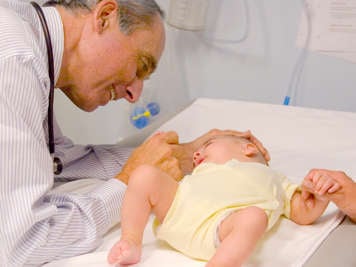In rare circumstances, your baby may need specialized care to address more serious health concerns. Below is a list of the health care professionals your newborn baby might need to see if specific medical issues arise.
Paediatrician
This is a medical doctor who specializes in the development of children and the diagnosis and treatment of diseases affecting children. Paediatricians provide well-baby visits, physicals, immunizations, and health concerns. Some paediatricians specialize in specific types of diseases and disorders.
Neonatologist
This is a paediatrician who specializes in the care of newborn babies who have problems such as prematurity, breathing problems, infection, jaundice, feeding problems, or birth defects. Your newborn baby might be referred to a neonatologist by your obstetrician, paediatrician, or family doctor. Neonatologists take care of newborn babies in the neonatal intensive care unit (NICU) of the hospital. Not all hospitals have a NICU, so if necessary, your baby might be transferred to a hospital that does.
Paediatric surgeon
This is a doctor who performs operations on newborn babies, older infants, and children. Before surgery, a paediatric surgeon evaluates the child’s medical condition. After surgery, they play an active role during the child’s recovery in the NICU or intensive care unit. Your newborn baby might be referred to a paediatric surgeon by a paediatrician or neonatologist if it is determined that your baby requires surgery.
Registered nurse
Registered nurses are involved in all aspects of your baby’s care while at the hospital.
Nurse practitioner
This is a registered nurse with additional education. They are able to perform some of the diagnostic and treatment functions that previously only doctors were allowed to do. They have advanced knowledge and decision-making skills that apply to assessment, diagnosis, drug prescription, and health promotion.
Respiratory therapist
This is a health professional specially trained to help with breathing disorders. Respiratory therapists provide breathing and oxygen support to newborn babies who have trouble getting enough oxygen into their blood because of respiratory problems or a heart condition. The most commonly used treatment is mechanical ventilation, which is a machine to help the newborn baby breathe. Respiratory therapists monitor the newborn baby’s respiratory function, and can show you how to give your baby oxygen at home if necessary.
Occupational therapist
This is a health care professional who can help your newborn baby overcome physical problems caused by prematurity, serious illness, or birth defects in order for them to grow and develop properly. They can also provide recommendations if your baby or child is having feeding issues.
Physiotherapist
These health care professionals provide therapy that can help prevent blockage of the lung passages by secretions and lung infections. Physiotherapists also identify movement problems and provide physical therapy to prevent or correct these problems, which can be caused by prematurity, serious illness, or birth defects. If your baby shows signs of neurological or motor problems, they may also be referred to a physiotherapist.
Dietitian
This is a health professional with expertise in healthy eating and nutrition. Dietitians help to prevent and treat illness through dietary modification. In premature babies and babies who are losing weight and failing to thrive, dietitians assess whether their nutrition and feeding are adequate. Sometimes they work with an occupational therapist to address any challenges to food intake.
The family support team at the hospital
If your newborn baby has serious health concerns requiring special treatment, you may feel stressed and out of control. You might also need to make difficult decisions for your newborn baby. Below is a list of the hospital staff who can help you through this challenging time.
Social worker
This is a person who offers supportive services, including individual, family, or group counselling, patient and family education, information regarding community resources, and referral to community-based services. You may want to talk to a social worker if you are worried about your newborn baby’s diagnosis, if you have trouble adjusting to your baby’s treatment, or if you are experiencing stress, family conflict, or grief.
Chaplain or spiritual advisor
Chaplains or spiritual advisors of different faiths offer pastoral care to newborn babies and their families. They perform religious services at hospitals. Most hospitals offer chapels, meditation rooms, or prayer rooms.
Bioethics consultant
These are professionals who can help parents who have concerns about ethical or moral issues having to do with their newborn baby’s care. They also work with members of the medical team to resolve any issues with the family that may be interfering with delivery of care. Bioethics consultants will not provide you with the "right answer" but may help you think through difficult decisions.
Volunteers
These are individuals who can come and help you, hold your baby, talk to you, and do other things such as knitting baby clothes.
Other specialists
If your newborn baby needs specific treatment for a particular condition, they may need to see other specialists. Below is a list of the types of specialists that are available, along with a very brief description of what they focus on.
- Cardiologist and cardiac surgeon: the heart
- Craniofacial surgeon: the skull or face, for example, a craniofacial surgeon can repair abnormalities such as cleft lip
- Dermatologist: the skin
- Ear, Nose and Throat (ENT) specialist or otolaryngologist: the ear, nose, and throat
- Endocrinologist: the endocrine system, which is responsible for secreting hormones
- Gastroenterologist: the stomach, intestines, and liver
- Geneticist: genetically determined diseases
- Gynaecologist: the female reproductive system
- Haematologist: the blood and blood-forming tissues such as bone marrow
- Immunologist: the immune system, which protects us against foreign invasion by bacteria, viruses, fungi
- Nephrologist: the kidneys
- Neurologist: the nervous system, that is, the brain, spinal cord, and nerves
- Ophthalmologist: the eye
- Orthopaedic surgeon: the bones, joints, muscles, ligaments, and tendons
- Radiologist: imaging techniques such as X-rays and ultrasound
- Respirologist: the lungs and respiratory tract
- Urologist: the urinary tract in boys and girls, and the reproductive tract in boys
